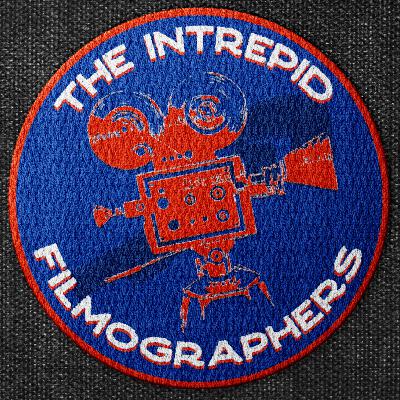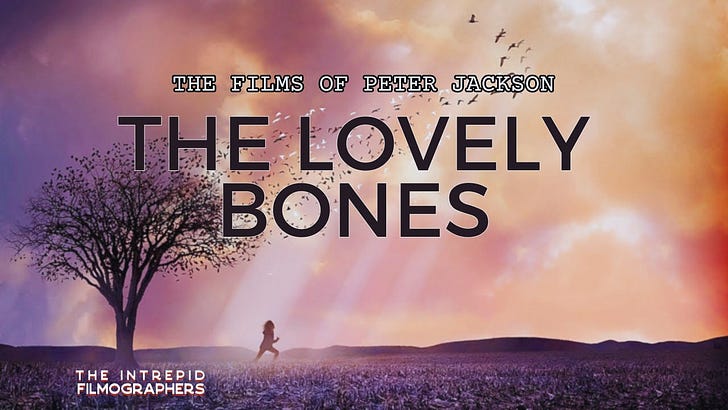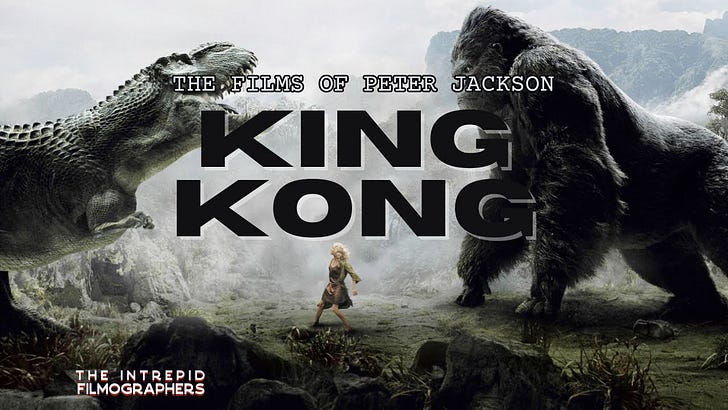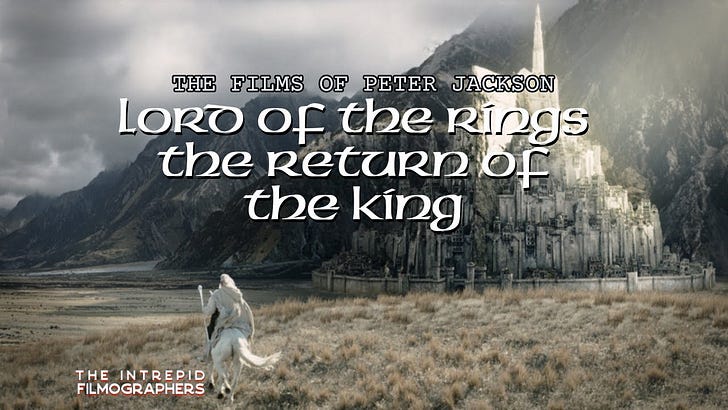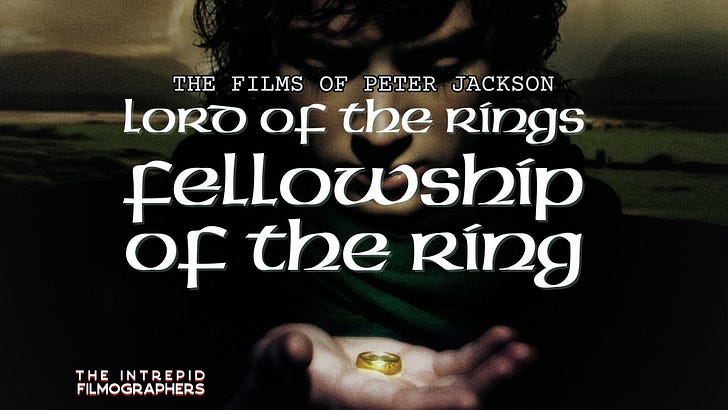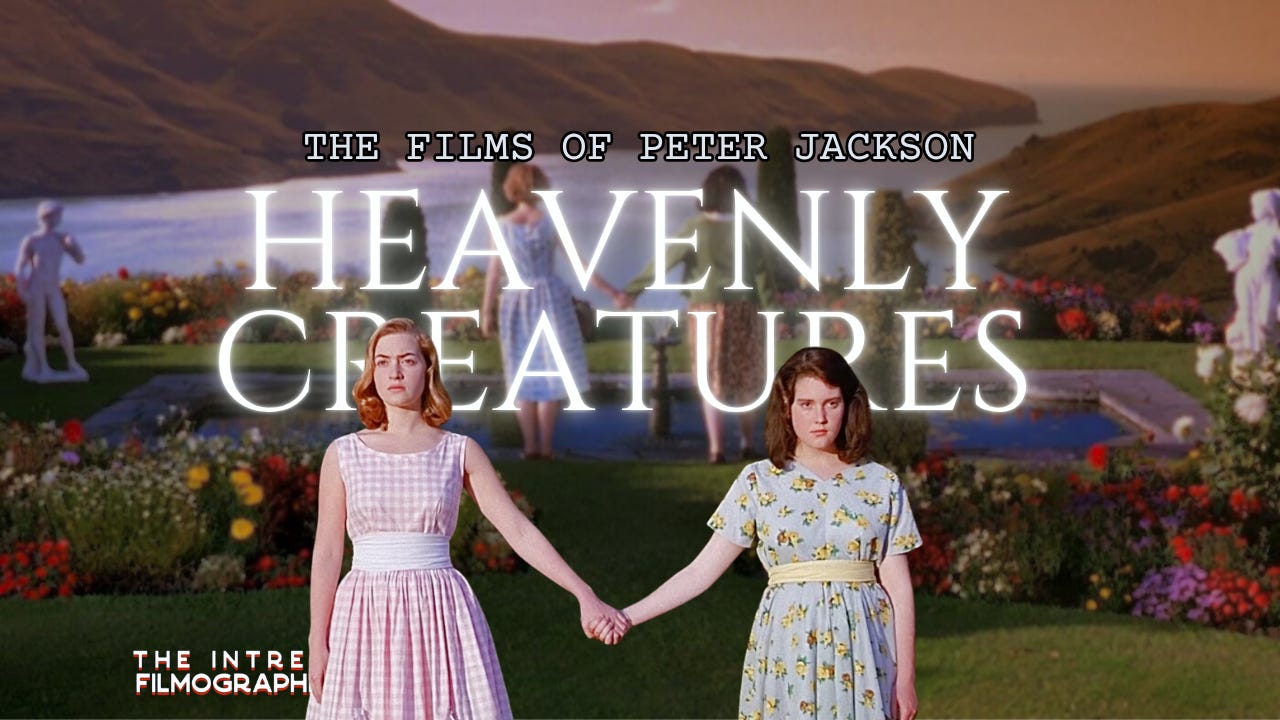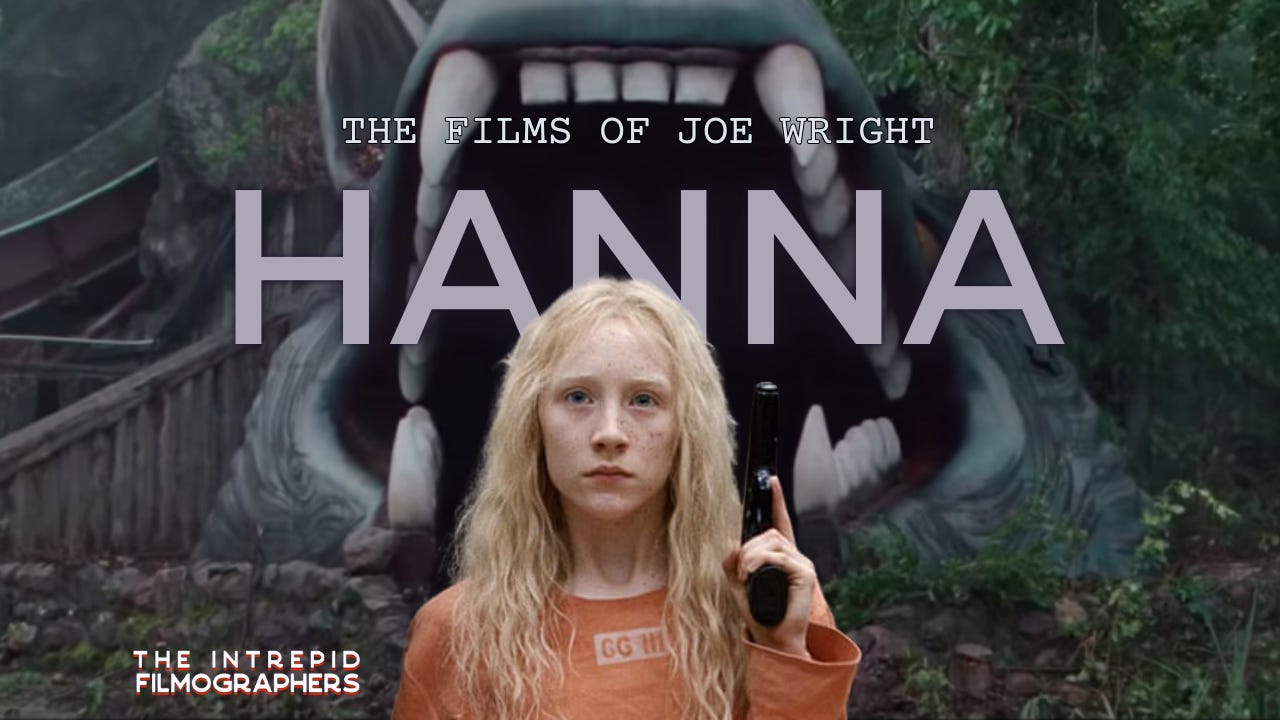Discover The Intrepid Filmographers
The Intrepid Filmographers

The Intrepid Filmographers
Author: Nick Rocco Scalia & Bobby Shortle
Subscribed: 3Played: 37Subscribe
Share
© The Intrepid Filmographers
Description
Exploring overlooked filmmakers' works with passion and fresh insights.
intrepidfilmographers.substack.com
intrepidfilmographers.substack.com
39 Episodes
Reverse
In this episode of The Intrepid Filmographers, Bobby Shortle and Nick Rocco Scalia return to Middle-earth to examine The Hobbit: The Desolation of Smaug, the second chapter in Peter Jackson’s ambitious Hobbit trilogy.Often remembered for its spectacle, this middle installment reveals something more on closer inspection: deliberate structure, careful character positioning, and some of the trilogy’s strongest filmmaking craft. From the kinetic joy of the barrel sequence to the operatic tension of Smaug’s introduction, we break down how Jackson balances momentum, political intrigue, expanding lore, and blockbuster action.We discuss:* How the film functions structurally as the “middle chapter”* The evolving dynamics between dwarves, elves, and men* Bilbo’s continued growth and the weight of his choices* The craftsmanship behind the barrel sequence* The design, performance, and digital achievement of Smaug* Where spectacle enhances story — and where it threatens to overwhelm itWith standout visual effects, confident pacing, and one of the most memorable dragon sequences in modern fantasy cinema, Desolation may be the trilogy’s most focused entry.Chapters00:00 Returning to The Desolation of Smaug01:59 Structure and Trilogy Cohesion07:58 Action Craft and Visual Effects16:44 Character Relationships and Development29:05 Gandalf, the Elves, and Expanding the World41:53 Romantic Subplots and Adaptation Choices45:57 The Barrel Sequence and Kinetic Storytelling55:55 Political Intrigue in Lake-town01:06:06 The Smaug Confrontation01:15:35 Balancing Spectacle and Narrative01:21:20 The Middle Chapter Challenge01:26:17 Peter Jackson’s Legacy This is a public episode. If you would like to discuss this with other subscribers or get access to bonus episodes, visit intrepidfilmographers.substack.com
In this episode of The Intrepid Filmographers, Bobby Shortle and Nick Rocco Scalia tackle Peter Jackson’s The Hobbit: An Unexpected Journey, a film burdened by expectation, production chaos, and the shadow of The Lord of the Rings trilogy.They explore the film’s troubled development, tonal shifts between whimsy and epic seriousness, and the challenge of expanding a relatively slim novel into a blockbuster franchise. Central to the discussion is Bilbo Baggins’ character arc, the overwhelming introduction of the dwarves, and how action sequences often crowd out quieter moments of character development.Bobby and Nick also dive into the controversial 48fps experiment, the mixed quality of CGI, the role of music in grounding emotion, and standout moments like Gollum’s riddle game, which briefly recaptures the magic of Middle-earth. While acknowledging the film’s visual ambition and box-office success, they reflect on how production realities shaped a movie that feels caught between nostalgia and franchise obligation.00:00 Back to Middle-earth11:37 Production Challenges and 48fps21:24 Initial Reactions and Expectations33:43 Introducing the Dwarves45:24 Balancing Character and Spectacle54:11 Visual Effects and Style01:02:30 Radagast and Tonal Shifts01:08:39 World-Building and Lore01:17:00 Franchise Expansion01:21:36 Bilbo’s Character Journey01:24:35 Gollum and the Power of Performance01:36:14 Legacy and Future of The Hobbit This is a public episode. If you would like to discuss this with other subscribers or get access to bonus episodes, visit intrepidfilmographers.substack.com
In this episode of The Intrepid Filmographers, Bobby Shortle and Nick Rocco Scalia examine Peter Jackson’s adaptation of Alice Sebold’s The Lovely Bones—a film defined as much by its ambition as by its struggles.They discuss the immense challenge of translating Sebold’s deeply interior novel to the screen, focusing on how the film grapples with grief, trauma, and the idea of an “in-between” world. Central to the conversation is Suzy Salmon’s journey, the underdeveloped supporting characters, and the controversial portrayal of the antagonist, George Harvey.Bobby and Nick analyze the film’s visual style, tone shifts, and narrative structure, questioning whether its reliance on visual effects ultimately undercuts its emotional core. While acknowledging the film’s sincerity and moments of resonance, they reflect on why The Lovely Bones feels like a well-meaning but incomplete realization of its source material—and how it fits into Peter Jackson’s post–Lord of the Rings career.Podcast Chapter Markers00:20 Introduction to The Lovely Bones Discussion01:41 Exploring the Source Material and Adaptation Challenges04:23 Character Analysis and Performance07:19 Thematic Elements and Tone10:17 Visual Storytelling and CGI Issues12:47 Comparative Analysis with Other Films15:50 Final Thoughts on Adaptation and Execution26:33 Exploring Grief and Letting Go29:20 Character Depth and Emotional Resonance31:52 The Impact of Performance Choices36:35 The Role of the Killer: A Missed Opportunity46:34 Thematic Elements of Justice and Grief50:00 Character Development and Relationships52:25 Thematic Elements and Plot Progression56:13 In-Between Realm and Cinematic Techniques57:34 Character Dynamics and Narrative Flaws01:05:24 Tone and Performance Issues01:10:21 Exploring the Afterlife and Narrative Choices01:12:15 Character Development and Missed Opportunities01:14:47 The Complexity of Emotional Connections01:17:16 Themes of Grief and Letting Go01:19:55 Visual Storytelling and Cinematic Failures01:24:47 Reflections on Peter Jackson’s Career This is a public episode. If you would like to discuss this with other subscribers or get access to bonus episodes, visit intrepidfilmographers.substack.com
In this episode of The Intrepid Filmographers, Bobby Shortle and Nick Rocco Scalia tackle Peter Jackson’s King Kong (2005)—a massive, deeply personal passion project that blends classic Hollywood romance with modern blockbuster filmmaking.They explore how Jackson reinterprets the iconic story through lavish visual style, ambitious action sequences, and surprisingly emotional character dynamics. From Skull Island as a living, breathing world to the tragic bond between Kong and Ann Darrow, the hosts discuss how the film balances CGI and practical effects in service of character rather than spectacle alone.The conversation digs into the film’s pacing and length, its homage to classic cinema, and its critique of filmmaking ambition itself. Bobby and Nick also reflect on how King Kong fits into Jackson’s career post–Lord of the Rings and why the film’s legacy continues to spark debate nearly two decades later.Podcast Chapter Markers00:20 Introduction to Peter Jackson’s King Kong04:12 The Legacy of King Kong09:16 Casting Choices and Character Dynamics16:20 Visual Style and Cinematic Techniques23:11 Exploring Themes and Messages28:51 The Adventure Begins on Skull Island35:04 The Role of CGI and Practical Effects39:05 The Climax and Conclusion of the Story01:00:44 The Art of Filmmaking01:07:33 Character Development and Emotional Depth01:16:07 The Spectacle of Action and Adventure01:24:54 The Tragic Love Story01:35:01 The Climax and Its Consequences01:44:24 Reflections on Modern Filmmaking This is a public episode. If you would like to discuss this with other subscribers or get access to bonus episodes, visit intrepidfilmographers.substack.com
In this episode of The Intrepid Filmographers, Bobby Shortle and Nick Rocco Scalia conclude their exploration of Peter Jackson’s landmark trilogy with an in-depth discussion of The Return of the King. They examine the film’s emotional power, monumental scale, and the deeply personal character arcs that bring Middle-earth’s story to its close.From the awe-inspiring design of Minas Tirith to the harrowing journey through Mordor, the hosts discuss how Return of the King balances epic battles with intimate moments of friendship, sacrifice, and loss. They explore standout performances—including Miranda Otto’s Éowyn and the tragic unraveling of Denethor—alongside the terrifying encounter with Shelob and the film’s masterful use of practical effects and CGI.The conversation reflects on how the ending resonates differently with audiences over time, why the journey home is just as important as the battles won, and how the trilogy’s legacy continues to shape modern filmmaking and storytelling.00:20 The Mask and Its Impact02:13 Brian’s Experience with The Lord of the Rings13:11 The Review Process and Its Challenges20:00 Trilogy Tuesday Experience28:00 The Impact of the Trilogy on Cinema33:51 Nerd Culture and Its Evolution39:36 Character Arcs and Emotional Stakes45:20 The Power of Non-Cynical Storytelling57:28 Minas Tirith: A New Location and Its Significance01:03:02 Character Dynamics and Symbolism01:09:45 Frodo and Sam’s Emotional Journey01:17:23 The Role of Arwen and Female Characters01:23:10 Exploring the Boundaries of PG-1301:28:04 Toughness in Tolkien’s World01:34:15 The Siege of Minas Tirith Begins01:40:09 The Terrifying Shelob Scene01:46:55 The Art of Action Scene Choreography01:53:31 The Power of Teamwork in Battle01:58:22 The Journey Through Mordor02:05:38 The Significance of Mount Doom02:10:35 The Joy of Fulfillment02:15:46 The Crowning Moment02:22:01 Homecoming and Reflection This is a public episode. If you would like to discuss this with other subscribers or get access to bonus episodes, visit intrepidfilmographers.substack.com
The Intrepid Filmographers continue their journey through Middle-earth with a deep dive into The Two Towers, the bold and emotionally charged middle chapter of Peter Jackson’s trilogy. Bobby Shortle and Nick Rocco Scalia explore the film’s daring departures from Tolkien’s text, the groundbreaking creation of Gollum, and the dramatic expansion of the world through Rohan, Fangorn Forest, and the looming threat of war.They discuss the film’s tonal complexity, the evolution of its characters, and the thematic threads—environmentalism, sacrifice, hope, and the human cost of conflict—that make The Two Towers one of the most ambitious sequels ever made. From the political tensions in Rohan to the towering achievement of Helm’s Deep, this episode examines why the film remains a landmark in fantasy storytelling and visual effects.Podcast Chapter Markers (+20 seconds added for intro theme)00:20 Introduction and Pre-Show Banter07:52 Comparative Analysis of Trilogies12:53 Adaptation and Editing Mastery17:48 The Technical Achievement of Gollum27:45 Gollum: A Multifaceted Character37:10 Emotional Depth and Character Complexity42:16 The Art of Character Creation47:14 The World of Rohan and Its Characters51:61 War Themes and Character Arcs01:02:52 The Anti-War Message in Tolkien’s Work01:10:12 The Importance of Friendship and Loyalty01:17:10 Battle Dynamics and Cinematic Techniques01:24:01 The Foreboding Nature of Mordor01:30:31 Human Cost of Conflict01:38:47 Faramir’s Moral Dilemma01:48:21 The Weight of War01:53:45 Helm’s Deep: A Cinematic Marvel02:00:22 The Power of Unity02:05:38 The Ents’ Vengeance02:10:50 Epic Battle Sequences and Character Moments02:28:10 The Power of Storytelling and Hope This is a public episode. If you would like to discuss this with other subscribers or get access to bonus episodes, visit intrepidfilmographers.substack.com
In this epic installment of The Intrepid Filmographers, Bobby Shortle and Nick Rocco Scalia embark on their journey into Middle-earth with The Fellowship of the Ring, the film that redefined modern fantasy cinema. The hosts explore Peter Jackson’s monumental achievement — from its awe-inspiring world-building and groundbreaking visuals to its emotional storytelling and timeless themes of courage, friendship, and sacrifice.They dive into the film’s cultural legacy, its influence on the fantasy genre, and the artistry behind its production — from Howard Shore’s unforgettable score to Andrew Lesnie’s luminous cinematography. Along the way, they examine standout performances, including Ian McKellen’s definitive Gandalf, and moments that continue to resonate with audiences decades later.This is more than a discussion about a movie — it’s a reflection on a cultural milestone, a cinematic triumph that shaped a generation of filmmakers and fans alike.Podcast Chapter Markers (with +20 seconds for intro theme)00:20 Nostalgic Treasures: Collectibles and Memories00:22 The Cultural Impact of The Lord of the Rings09:02 Anticipation and Experience of the Film’s Release13:48 The Significance of the Extended Editions18:31 Exploring the Themes of Adventure and Camaraderie23:26 The Epic Journey: A Road Movie Experience29:10 Balancing Epic Scale with Character Depth35:00 The Importance of Faith and Belief in Storytelling40:54 Casting Choices and Their Impact53:55 Casting Choices and Character Dynamics01:04:05 Bilbo’s Journey and the Weight of Legacy01:13:22 The Ring’s Burden and the Call to Adventure01:21:51 Character Development and Organic Storytelling01:27:26 Visual Storytelling and Atmosphere01:32:17 The Importance of Songs and Culture01:38:03 Thematic Depth: Elves and Their Legacy01:48:21 The Unique World of Middle-earth01:55:31 The Weight of Responsibility02:02:35 The Riddle of Moria’s Door02:08:54 The Burden of the Ring02:15:27 Gandalf’s Stand: A Moment of Sacrifice02:24:22 The Aftermath: Mourning and Moving Forward02:32:43 The River Journey: Ancient Statues and Awe02:38:02 Cinematic Scope and Character Connection02:45:39 Emotional Farewells and Character Growth02:51:33 Box Office Success and Cultural Impact02:58:27 Conclusion and Future Discussions This is a public episode. If you would like to discuss this with other subscribers or get access to bonus episodes, visit intrepidfilmographers.substack.com
Bobby Shortle and Nick Rocco Scalia continue their exploration of Peter Jackson’s filmography with a deep dive into The Frighteners — the supernatural horror-comedy that bridged his cult horror roots and his Hollywood blockbuster future.The hosts discuss Michael J. Fox’s magnetic performance, the film’s groundbreaking visual effects, and how Jackson’s signature energy shines through every ghostly gag and chilling twist. They reflect on The Frighteners’ unique tone, which balances death, grief, and slapstick comedy, while also examining the director’s cut, studio challenges, and the film’s lasting cult status.From its dark humor to its heart, this episode uncovers why The Frighteners remains a fascinating milestone in Peter Jackson’s career — and a nostalgic favorite for fans of ‘90s genre filmmaking.Podcast Chapter Markers (with +20 seconds for intro theme)00:20 Nostalgia for Scary Movies and Scream03:39 Michael J. Fox: A Formative Influence09:38 Peter Jackson’s Unique Directorial Approach15:25 The Impact of The Frighteners on Peter Jackson’s Career28:10 Creative Collaboration in Filmmaking33:28 Filming in New Zealand: A Unique Vision37:38 Studio Decisions and Release Strategy42:24 Innovative Visual Effects Techniques55:06 The Hyperactive Energy of Cinematic Storytelling01:00:39 Character Dynamics and Relationships01:06:19 Exploring Themes of Death and Existence01:09:16 World-Building and Character Development01:12:23 The Role of Cameos and Supporting Characters01:15:12 Romantic Elements in a Supernatural Context01:20:09 The Weight of Loss in Comedy01:21:27 Cartoonish Elements and Humor01:22:50 Character Dynamics and Emotional Depth01:24:07 The Role of Jeffrey Combs01:25:40 The Interrogation Scene and Tension01:26:58 The Ghosts’ Relationships and Emotional Stakes01:29:26 The Museum Scene and Special Effects01:30:52 The Shift in Tone and Character Development01:34:20 Dread and Character Connection01:35:42 The Climax and Action Sequence01:46:37 Suspense and Tension in Storytelling01:47:49 Dual Threats: Physical and Spiritual01:49:13 Character Dynamics and Villainy01:50:57 Revealing True Motives01:52:54 Creative Collaboration in Filmmaking01:53:45 High Stakes and Compelling Action01:55:27 Exploring Dark Themes01:56:40 Visual Effects and Their Impact02:00:17 Emotional Resolutions and Character Arcs02:01:16 Critical Reception and Personal Taste02:04:57 Creativity in Filmmaking02:08:52 Looking Ahead: Future Projects This is a public episode. If you would like to discuss this with other subscribers or get access to bonus episodes, visit intrepidfilmographers.substack.com
In this episode, Bobby Shortle and Nick Rocco Scalia turn their focus to Heavenly Creatures — the haunting, beautiful, and deeply human drama that marked a turning point in Peter Jackson’s career. Moving away from splatter and satire, Jackson crafts a film of emotional precision, exploring the intense friendship between two teenage girls (played by Melanie Lynskey and Kate Winslet) whose bond spirals into fantasy, obsession, and tragedy.Bobby and Nick discuss how Heavenly Creatures blends realism with imaginative fantasy sequences, how it captures adolescence’s volatility, and why it remains one of Jackson’s most emotionally sophisticated works. From its delicate portrayal of friendship and creativity to its chilling depiction of violence and consequence, the hosts examine how this film bridged the gap between Jackson’s early cult chaos and his later cinematic mastery.CHAPTERS:00:20 Introduction to Heavenly Creatures05:41 Exploring the Themes of Friendship and Crime11:07 The Impact of the Film on Peter Jackson’s Career16:44 The Legacy of Heavenly Creatures26:30 Exploring Fantasy and Violence in Film27:53 The Challenge of Finding the Film28:37 Stylistic Choices and Cinematic Techniques30:32 The Restless Camera and Emotional Experience32:36 New Zealand as a Character33:33 Balancing Immaturity and Maturity in Storytelling34:25 Juxtaposition of Idyllic and Dark Themes38:14 Character Introductions and Development43:39 Class Dynamics and Character Relationships47:15 Real Characters and Interior Lives51:19 The Power of Montage in Storytelling52:49 Character Depth and Realism in Film54:25 The Evolution of Relationships: From Sweet to Sour56:40 The Impact of Societal Pressures on Youth58:20 The Role of Supportive Relationships in Creative Expression01:00:02 Understanding the Characters: Sympathy vs. Psychopathy01:02:18 The Complexity of Childhood and Adult Perceptions01:06:13 Fantasy vs. Reality: The Blurring Lines01:11:07 The Consequences of Isolation and Misunderstanding01:16:03 Exploring the Emotional Depths of Relationships01:18:28 Navigating Parental Dynamics and Their Impact01:24:22 The Consequences of Misplaced Anger01:30:15 The Complexity of Young Love and Its Dark Turns01:34:40 The Intersection of Fantasy and Reality in Adolescence01:40:06 The Stakes of Friendship and Life01:42:05 Foreshadowing and Symbolism in the Narrative01:43:35 The Shift to Docudrama: Reality of the Crime01:45:48 The Disturbing Reality of Violence01:47:43 Aftermath and Consequences of Actions01:49:52 Balancing Sympathy and Horror in Storytelling01:54:18 Awards and Recognition of the Film01:57:52 Final Thoughts and Comparisons to Other Films This is a public episode. If you would like to discuss this with other subscribers or get access to bonus episodes, visit intrepidfilmographers.substack.com
Bobby Shortle and Nick Rocco Scalia continue their journey through Peter Jackson’s early career with his outrageous cult classic Braindead (released as Dead Alive in the U.S.). Known as one of the goriest movies ever made, the film blends over-the-top splatter effects with slapstick comedy, romance, and family drama in a way only Jackson could pull off.In this episode, Bobby and Nick explore the film’s wild mix of horror and humor, its cultural context in New Zealand cinema, and the technical ingenuity that made its practical effects legendary. From zombie kung-fu priests to the infamous “Your mother ate my dog” scene, Dead Alive stands as both a landmark in horror comedy and a glimpse into the fearless creativity that would define Jackson’s career.Podcast Chapter Markers 00:20 Introduction and Personal Experiences02:45 Exploring Peter Jackson's Filmography05:42 The Making of Dead Alive08:33 New Zealand's Film Industry Support11:34 Cultural Context and Film Production14:31 Personal Histories with Dead Alive16:39 Film Structure and Themes19:18 Character Development and Relationships22:25 Conclusion and Final Thoughts27:37 Character Dynamics and Emotional Stakes30:14 Romantic Comedy Elements in Horror32:25 Evolution of Peter Jackson's Filmmaking35:30 The Balance of Gore and Storytelling37:22 Visual Style and Cinematic Techniques42:28 Character Introductions and Relationships46:38 Thematic Elements of Control and Rebellion50:07 Montage and Storytelling Techniques53:23 Dark Humor and Over-the-Top Scenarios55:08 Tragic Trolley Incident and Funeral Scene56:44 Uncle Les and the Inheritance Plot57:49 Introduction of Key Characters and Backstory58:35 The Chaos of Zombie Transformation01:01:39 Lionel's Struggles with His Zombie Family01:04:33 The Zombie Baby and Its Hilarious Antics01:06:25 The Party and Unraveling Chaos01:08:22 The Climactic Showdown and Gore Fest01:17:54 The Art of Chaos in Film01:20:43 Innovative Gore and Practical Effects01:23:22 Character Development and Unexpected Twists01:25:36 Thematic Depth and Emotional Resonance01:28:08 Peter Jackson's Evolution as a Filmmaker01:30:20 Looking Ahead: Future Projects and Directions This is a public episode. If you would like to discuss this with other subscribers or get access to bonus episodes, visit intrepidfilmographers.substack.com
Join Bobby Shortle and Nick Rocco Scalia as they navigate the bizarre and grotesque world of Peter Jackson's Meet the Feebles. This episode dives into the film’s strange blend of puppetry, satire, and shock value, unpacking how it reflects Jackson’s wild early creativity. From the movie’s grotesque humor to its biting commentary on fame, sex, and show business, Bobby and Nick explore why this cult oddity remains one of the most polarizing films of Jackson’s career.Whether you love it, hate it, or just can’t look away, Meet the Feebles offers a fascinating window into the filmmaker who would go on to direct The Lord of the Rings.Podcast Chapter Markers00:20 - Introduction05:35 - Overview of Peter Jackson's Early Career12:50 - Film Synopsis and Themes26:05 - Technical Aspects and Puppetry35:20 - Personal Reactions and Critiques45:40 - Cultural Impact and Reception55:20 - Conclusion and Next Episode Preview This is a public episode. If you would like to discuss this with other subscribers or get access to bonus episodes, visit intrepidfilmographers.substack.com
In this episode, Bobby Shortle and Nick Rocco Scalia launch a brand-new mini-series exploring the films of Peter Jackson, beginning with his outrageous cult classic Bad Taste. They dive into Jackson’s journey from no-budget DIY filmmaker in New Zealand to one of the most celebrated directors of his generation. Along the way, they discuss the film’s absurd humor, inventive practical effects, and the alien fast food concept that cemented its place in horror-comedy history. From Monty Python-inspired gags to Sam Raimi–style energy, Bad Taste is both disgusting and hilarious — and an early showcase of Jackson’s boundless creativity.Takeaways* Bad Taste reflects Jackson’s creativity, ambition, and influences.* Shot on a shoestring budget over four years, the film is a DIY triumph.* The absurd humor and body horror gags give the film its cult status.* Practical effects and action sequences highlight Jackson’s ingenuity.* This early work serves as a calling card for Jackson’s later career.Chapters00:20 Exploring Bad Taste and Its Impact01:05 The Journey of Peter Jackson: From No-Budget to Big Budget01:27 The Influence of Early Works on Jackson's Career03:58 The Evolution of Filmmaking: Jackson's Unique Style06:46 Personal Connections to Jackson's Films09:38 The Making of Bad Taste: Behind the Scenes12:14 Reflections on Jackson's Legacy and Future14:51 Behind the Scenes: The Making of the Film17:43 Innovative Techniques and Special Effects20:25 Narrative Structure and Storytelling Challenges23:09 Character Development and Humor28:43 Visual Storytelling and Action Sequences31:13 Practical Effects and Audience Engagement32:11 Exploring the Absurdity of Humor in Bad Taste34:10 Character Dynamics and Plot Development35:46 The Fast Food Alien Concept37:46 Visual Effects and Practical Ingenuity39:49 Gags and Humor in Action Sequences42:28 The Climax and Its Ambitious Execution50:23 The Perils of Filmmaking53:15 The Charm of DIY Filmmaking55:57 The Evolution of Peter Jackson59:34 The Fun of Horror Movies01:04:38 The Resurgence of Mid-Budget Horror This is a public episode. If you would like to discuss this with other subscribers or get access to bonus episodes, visit intrepidfilmographers.substack.com
In the final entry of their Joe Wright miniseries, Bobby Shortle and Nick Rocco Scalia tackle one of the director’s boldest and most overlooked works: Cyrano (2021). A stylized musical romance starring Peter Dinklage, with music by The National, Cyrano reimagines the classic tale with modern emotion, theatrical visuals, and a deeply tragic heart.The conversation covers the film’s COVID-delayed release, box office struggles, and Wright’s distinct blend of humor, heartbreak, and visual flourish. From its heartfelt songs to the devastating climax, Bobby and Nick unpack the film’s exploration of self-worth, love, and sacrifice—while also reflecting on where it fits within the arc of Joe Wright’s filmography.Time Codes:* 00:20 – The Length of Podcasts: A Listener's Perspective* 01:06 – Introducing Cyrano: A Journey Through Joe Wright's Filmography* 03:54 – The Musical Elements of Cyrano* 06:40 – The Challenges of Releasing Cyrano During COVID* 09:41 – Audience Expectations and Box Office Performance* 12:28 – Personal Reflections on Cyrano* 15:11 – The Visual and Emotional Appeal of Cyrano* 16:53 – Theatrical Choices in Film Adaptation* 20:31 – Musical Elements and Their Impact* 24:29 – Character Introductions and Development* 30:29 – Action and Choreography in Cyrano* 41:08 – Visual Aesthetics and Symbolism in Scenes* 42:12 – Exploring Prestige Cinema and Its Risks* 44:11 – The Complexity of Cyrano’s Character* 46:26 – The Power of Performance and Emotion* 49:32 – Themes of Insecurity and Tragedy* 50:53 – The Dynamics of Love and Friendship* 54:23 – The Musical Elements and Their Impact (Revisited)* 58:29 – Character Relationships and Development* 01:01:11 – Villainy and Moral Ambiguity* 01:05:16 – Empathy and Understanding in Conflict* 01:06:25 – The Shift to War: A Cinematic Transition* 01:08:53 – Emotional Depth: The Impact of War on Characters* 01:13:30 – The Heartbreaking Song: A Moment of Reflection* 01:18:17 – Final Confessions: Love and Loss* 01:22:56 – Joe Wright’s Unique Vision: A Retrospective* 01:27:53 – Ranking Joe Wright’s Films: A Discussion* 01:31:37 – Diverse Perspectives on Joe Wright’s Films* 01:34:26 – Exploring the Nuances of Hanna and Darkest Hour* 01:38:11 – The Emotional Depth of Cyrano and Atonement* 01:42:02 – Contrasting Styles: Pride & Prejudice vs. Anna Karenina* 01:46:47 – Final Rankings and Reflections on Joe Wright’s Filmography This is a public episode. If you would like to discuss this with other subscribers or get access to bonus episodes, visit intrepidfilmographers.substack.com
In this episode of The Intrepid Filmographers, Bobby Shortle and Nick Rocco Scalia explore one of the most polarizing films in Joe Wright’s career: The Woman in the Window (2021). A domestic thriller steeped in paranoia, visual style, and production controversy, the film features Amy Adams as an agoraphobic woman who may—or may not—have witnessed a murder across the street.The hosts dive deep into the movie’s Hitchcockian influences, its unreliable narrator, the behind-the-scenes chaos, and whether Joe Wright’s ambitious stylization enhances or overshadows the story. With sharp takes on Gary Oldman’s unhinged charm, the campy tonal swings, and the red umbrella of doom, this is a wide-ranging conversation on the limits of adaptation, the pressure of audience expectations, and the beauty and frustration of a film that’s almost something great.Podcast Chapter Timecodes* 00:20 – Introduction to the Filmography of Joe Wright* 04:55 – The Unreliable Narrator and Its Impact* 07:37 – The Influence of Rear Window and Other Thrillers* 10:23 – The Production Journey of The Woman in the Window* 13:13 – The Reception and Critique of the Film* 16:12 – The Camp Factor: A Bad Movie or Intentional Parody?* 18:49 – Final Thoughts and Recommendations* 29:45 – Exploring the Movie's Flaws* 31:15 – Character Analysis and Performances* 34:32 – Visual Style and Cinematography* 37:48 – Character Dynamics and Relationships* 41:16 – Plot Development and Storytelling Techniques* 46:01 – Strange Performances and Character Interactions* 54:27 – Appreciating Cinematic Connections* 55:48 – Character Dynamics and Thematic Connections* 57:12 – Performance Analysis: Actors in Focus* 58:27 – Visual Storytelling and Editing Techniques* 01:00:08 – Narrative Structure and Character Development* 01:01:37 – The Role of Voyeurism in the Story* 01:04:09 – Murder Scene: A Turning Point* 01:06:15 – Humor in Dark Situations* 01:07:35 – Symbolism and Visual Motifs* 01:10:44 – Reveals and Character Interactions* 01:15:41 – Building Suspense and Tension* 01:18:24 – Unraveling the Mystery of the Child* 01:20:33 – The Complexity of Family Dynamics* 01:22:25 – The Role of Technology in Suspense* 01:24:13 – Directorial Choices and Visual Storytelling* 01:26:04 – Joe Wright's Career Trajectory* 01:32:02 – The Climax of Tension and Revelation* 01:43:16 – Exploring the Depths of Despair* 01:46:49 – The Complexity of Human Emotion* 01:49:14 – Unraveling the Mystery of the Antagonist* 01:52:36 – The Climactic Confrontation* 01:54:28 – The Aftermath of Trauma* 02:01:04 – Reflections on the Film's Reception This is a public episode. If you would like to discuss this with other subscribers or get access to bonus episodes, visit intrepidfilmographers.substack.com
In this episode of The Intrepid Filmographers, Bobby Shortle and Nick Rocco Scalia dig into Joe Wright’s Oscar-winning World War II drama Darkest Hour. Anchored by Gary Oldman’s transformative performance as Winston Churchill, the film explores the burden of leadership in the face of global crisis.The hosts unpack the narrative structure, the theatricality of Wright’s direction, and whether the film transcends the biopic formula. They also debate the effectiveness of the screenplay, the role of supporting characters like Lily James and Kristin Scott Thomas, and the controversial underground scene. This episode blends history, performance, and craft in an honest look at one of Wright’s most celebrated films.Chapters* 00:20 – Exploring Joe Wright's Filmography* 04:20 – The Art of Biopics: Focusing on Key Moments* 09:31 – Gary Oldman's Transformation into Churchill* 14:44 – Gary Oldman's Career Evolution* 17:41 – Villainy and Redemption in Oldman's Roles* 20:25 – Oscar Buzz and the Nature of Awards Season* 26:11 – Critique of Film Reviews and Meta Context* 28:10 – Performance and Entertainment Value in Film* 30:00 – Script and Direction: A Critical Analysis* 32:48 – Character Dynamics and Historical Context* 35:46 – The Role of the King and Government Dynamics* 38:25 – The Balance of Humor and Seriousness in Darkest Hour* 48:57 – The Human Toll of War and Decision Making* 55:30 – Introduction of Key Characters and Dynamics* 56:39 – Cinematic Techniques and Space Definition* 58:03 – Direction and Production Design Insights* 01:00:08 – Character Development and Dialogue Quality* 01:00:58 – Tension and Suspense in Key Scenes* 01:03:47 – Churchill's Decision-Making and Leadership* 01:04:53 – Thematic Connections to Other Historical Films* 01:05:42 – The Impact of Churchill's Speech* 01:07:27 – Gary Oldman's Performance as Churchill* 01:12:39 – Supporting Characters and Their Roles* 01:13:45 – Critique of Character Arcs and Resolutions* 01:21:03 – The King’s Revelation* 01:23:29 – Connecting with the People* 01:25:52 – The Underground Scene* 01:28:29 – The Weight of Leadership* 01:31:01 – Chamberlain’s Role* 01:32:49 – The Climactic Speech* 01:35:11 – Reflections on the Film* 01:39:34 – Looking Ahead This is a public episode. If you would like to discuss this with other subscribers or get access to bonus episodes, visit intrepidfilmographers.substack.com
In this episode of The Intrepid Filmographers, Bobby Shortle and Nick Rocco Scalia tackle Joe Wright’s 2015 film Pan — a fantastical, big-budget reimagining of the Peter Pan mythos that crashed and burned at the box office.They break down the film’s chaotic tone, baffling creative choices, and stunning visuals that can’t quite hide a hollow core. From Hugh Jackman’s over-the-top Blackbeard to the ill-fated Nirvana sing-along, this conversation explores the fine line between artistic risk and creative misfire. With themes of betrayal, chosen one tropes, and lost franchise dreams, the episode highlights where Pan soars, stumbles, and just plain confuses.Chapters* 00:20 – Discussion on the Cast and Crew of Pan* 01:49 – The Financial and Critical Reception of Pan* 04:41 – Analyzing the Themes and Tone of Pan* 07:22 – Comparative Analysis with Other Films* 10:17 – Final Thoughts on Pan and Its Legacy* 16:36 – Mythology and Action Scenes* 20:46 – Character Development and Performances* 24:09 – Opening Scenes and Visual Style* 28:24 – Musical Elements and Tone* 32:59 – Cultural Representation and Design* 37:26 – Music Choices and Their Impact* 42:38 – Script Quality and Storytelling* 44:00 – The Tone of Peter Pan Adaptations* 46:53 – Character Dynamics and Expectations* 50:26 – Visual Effects and Cinematic Quality* 53:35 – Plot Development and Narrative Structure* 56:22 – The Chosen One Trope and Its Implications* 01:00:11 – Themes of Death and Adventure* 01:04:02 – Production Quality and Audience Reception* 01:06:53 – The Quest for Fairies and Blackbeard’s Ambitions* 01:09:32 – Visuals and Settings: A Mixed Bag* 01:12:08 – Action Sequences: Weightless and Incomprehensible* 01:15:34 – Character Relationships: Peter and Hook’s Dynamic* 01:19:42 – The Conclusion: Missed Opportunities and Final Thoughts* 01:27:59 – Critique of Live By Night vs. Pan* 01:29:54 – Anticipation for Upcoming Films* 01:31:03 – The Challenges of Filmmaking* 01:34:13 – Critics and Audience Reception* 01:36:11 – Casting Choices and Performance Analysis* 01:38:58 – The Future of Peter Pan and Robin Hood Films This is a public episode. If you would like to discuss this with other subscribers or get access to bonus episodes, visit intrepidfilmographers.substack.com
In this conversation, Bobby Shortle and Nick Rocco Scalia delve into Joe Wright's adaptation of Anna Karenina, exploring its themes of love, societal expectations, and the unique theatrical style that defines the film. They discuss the complexities of character dynamics, the visual storytelling techniques employed, and the critical reception of the film, ultimately reflecting on its impact and significance in the realm of literary adaptations. In this conversation, the hosts delve into the themes of love, societal expectations, and the tragic downfall of Anna Karenina. They explore the artifice of society, the tension of forbidden love, and the consequences of choices made by the characters. The discussion also highlights the parallel lives of Levin and Kitty, the complexity of relationships, and the societal judgment faced by Anna. Ultimately, they reflect on the tragic end of Anna's journey and the themes of redemption and regret woven throughout the narrative.Time Stamps:* 00:20 – Introduction to Anna Karenina* 05:03 – Theatricality and Storytelling* 10:45 – Themes of Love and Society* 16:27 – Comparative Analysis with Other Works* 29:10 – The Complexity of Performance* 30:06 – The Theatrical Nature of Storytelling* 31:06 – Pacing and Engagement in Adaptation* 32:37 – Character Depth and Moral Ambiguity* 37:27 – Thematic Tensions and Character Relationships* 38:40 – Narrative Style and Audience Expectations* 39:57 – Visual Storytelling and Theatrical Elements* 42:17 – Contrasting Worlds: Society vs. Nature* 46:45 – Character Journeys and Personal Growth* 52:22 – The Art of Cinematic Transitions* 55:15 – The Artifice of Society* 57:18 – The Tension of Forbidden Love* 58:29 – The Consequences of Choices* 01:02:08 – The Struggles of Identity and Belonging* 01:03:35 – Parallel Lives: Levin and Kitty* 01:05:53 – Revisiting Past Connections* 01:08:00 – The Weight of Societal Expectations* 01:10:20 – The Complexity of Love* 01:13:35 – The Deterioration of Relationships* 01:18:34 – The Theatricality of Tragedy* 01:20:05 – Exploring Anna's Choices and Consequences* 01:22:48 – The Breakdown of Anna's Life* 01:24:59 – The Inevitable Tragedy of Anna Karenina* 01:26:57 – Character Dynamics and Moral Ambiguities* 01:29:53 – The Complexity of Love and Sacrifice* 01:33:22 – Feminism and Historical Context in Anna Karenina* 01:35:21 – Comparative Analysis of Character Arcs* 01:38:23 – Final Thoughts on Joe Wright's Adaptation This is a public episode. If you would like to discuss this with other subscribers or get access to bonus episodes, visit intrepidfilmographers.substack.com
Joe Wright goes full fairy tale assassin in Hanna (2011), a genre-defying mix of espionage thriller, coming-of-age story, and arthouse action. In this episode, Bobby and Nick dig into the wild tonal swings, Chemical Brothers score, and stylized direction that marks Wright’s biggest departure yet. They also examine Hanna’s lasting influence, why some scenes still hit hard, and what happens when a filmmaker maybe tries a little too hard to prove they can do something different. It’s a divisive one—so get ready to argue about Tom Hollander’s tiny white shorts and whether this is a future cult classic or just an ambitious misfire.Podcast Chapter Timecodes* 00:20 – Joe Wright Reinvents Himself: Hanna Overview* 06:20 – First Impressions Then vs. Now* 12:40 – The Origins of the Script and Genre Blending* 19:00 – Performances: Saoirse Ronan, Cate Blanchett, Eric Bana* 26:30 – That Bunker Escape Sequence Rules* 34:10 – The Road Trip Detour: Pacing and Structure Issues* 42:50 – Visual Style & Sound Design* 50:20 – Is This Elevated Genre or Overdirected Mayhem?* 58:30 – Final Thoughts & Ranking Hanna in the Wright Filmography1:00:10 – Final Thoughts & What’s Next This is a public episode. If you would like to discuss this with other subscribers or get access to bonus episodes, visit intrepidfilmographers.substack.com
Our journey through the films of Joe Wright continues as we dive into one of his most unexpected career turns: The Soloist (2009), starring Jamie Foxx and Robert Downey Jr. Based on the true story of journalist Steve Lopez and musician Nathaniel Ayers, this film tackles themes of mental illness, race, music, and the ethics of storytelling. We dig into Wright’s experimental sound design, the tension between empathy and exploitation, and the role of art as both a bridge and a burden. This one sparks some of our most personal conversation yet — join us for an honest and emotional exploration.Podcast Chapters:* 00:20 – Intro & Joe Wright Career Context* 05:20 – First Reactions & Expectations* 12:40 – The Real Story Behind The Soloist* 18:10 – Jamie Foxx & Robert Downey Jr. Performances* 25:00 – Mental Illness & Ethical Representation* 31:30 – Race, Class, and Power in the Narrative* 39:00 – Sound Design as Subjective Experience* 46:50 – Journalism, Help, and Self-Interest* 53:20 – Does It Work As a Joe Wright Film?* 1:00:10 – Final Thoughts & What’s Next This is a public episode. If you would like to discuss this with other subscribers or get access to bonus episodes, visit intrepidfilmographers.substack.com
Our Joe Wright miniseries continues with Atonement (2007), his sweeping and emotionally devastating follow-up to Pride & Prejudice. Reuniting with Keira Knightley and bringing in James McAvoy, Saoirse Ronan, and Vanessa Redgrave, Wright adapts Ian McEwan’s acclaimed novel into a visually lush and stylistically bold portrait of love, guilt, war, and the stories we tell ourselves.In this episode, Bobby Shortle and Nick Rocco Scalia break down the film’s shifting timelines, theatrical flourishes, and that now-iconic Dunkirk tracking shot. They also unpack the film’s controversial twist, the role of perspective in both narrative and filmmaking, and how Atonement walks the line between emotional sincerity and self-aware artifice.Is Atonement one of the best films of the 2000s—or just an impressive exercise in cinematic style? We dig in.Topics Covered:* Joe Wright’s escalation in visual ambition after Pride & Prejudice* Saoirse Ronan’s breakout performance and complex character* Keira Knightley and James McAvoy’s chemistry and constraints* The Dunkirk tracking shot: cinematic brilliance or showy excess?* The film’s twist ending and what it says about guilt and storytelling* Atonement as meta-narrative and the question of "perspective"* How it fits into 2007’s all-time-great movie yearPodcast Chapter Timecodes:* 00:20 – Kicking off Atonement: Initial impressions and 2007 context* 08:50 – Performances: Saoirse Ronan, McAvoy, Knightley, and more* 18:55 – Structure & timeline shifts: three acts, three perspectives* 27:20 – The iconic Dunkirk tracking shot and visual ambition* 36:10 – Perspective vs. reality: is Briony the ultimate unreliable narrator?* 45:15 – Exploring the twist ending and the concept of atonement* 54:30 – Final thoughts: masterwork, misfire, or somewhere in between? This is a public episode. If you would like to discuss this with other subscribers or get access to bonus episodes, visit intrepidfilmographers.substack.com


